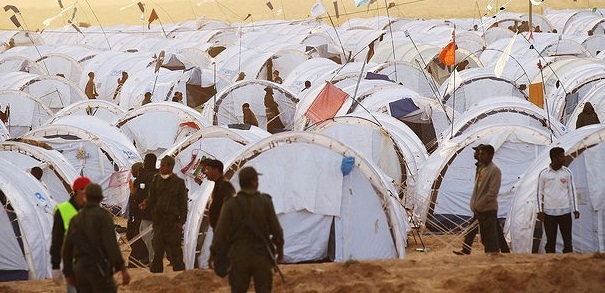The UN Refugee Agency (UNHCR) has published its updated Position on Returns to Libya, replacing the position taken in 2015. It urges all States to suspend forcible returns to Libya until the security and human rights situation has improved sufficiently, and determines that internal flight or relocation should not be considered an alternative while the relevance and reasonableness criteria are not being met.
As of 31 August 2018, UNHCR in Libya had registered 55,008 refugees and asylum-seekers. These people are particularly vulnerable with regard to deteriorating socio-economic conditions, the volatile security situation, and exclusion from the most basic of services. Furthermore, they are at acute risk of arrest and detention for irregular stay.
Refugees and asylum seekers who are intercepted at sea and returned to Libya by the Libyan Coast Guard, are transferred to government- run detention centres where they are held for indefinite periods. OHCHR, MSF and Amnesty International have described the conditions as “appalling”, “nightmarish”, and “cruel, inhuman and degrading.” Currently its estimated that at least 8000 people are being held in these detention centres and an unknown number are held by armed criminal networks in ‘unofficial detention centres’; frequently in warehouses and on farms.
Refugees and asylum-seekers, including children, are deemed to be at extreme risk of abuse at the hands of smugglers, traffickers, armed groups, militias, criminal gangs and state officials acting with impunity. These violations and abuses reportedly include “unlawful deprivation of liberty; torture and other forms of ill-treatment, including rape and other forms of sexual violence; abduction for ransom and other forms of extortion; forced labour; and unlawful killing”.
Clashes in Libya’s capital Tripoli have intensified in recent weeks, further increasing the risks faced by refugees and migrants. At the Fallah 2 Tawergha settlement, which hosts more than 900 displaced Libyans, two people were killed and several others injured as armed groups exchanged fire on Sunday night. The violence have prevented UNHCR, Libyan Ministry of Interior and World Food Programme attempts to deliver emergency food and health supplies to those trapped in government detention centres,.
Last week, Reuters reported that some 400 people were abandoned in the Ain Zara detention centre when guards fled their posts during the clashes. One aid worker said that “There are about 400 people locked in the Ain Zara detention center, among them 200 men and 200 women and 20 children under five years without food and water”.
UNHCR spokesperson Charlie Yaxley told reporters “We are closely monitoring the situation and coordinating with the Libyan Directorate for Combatting Illegal Migration and UN agencies, and advocating for all refugees and migrants to be relocated to a safer place”. On Tuesday, the United Nations announced that armed militias in Tripoli have agreed to a ceasefire with the government, “to end all hostilities, protect civilians, safeguard public and private property.”
For further information:
- UN High Commissioner for Refugees, UNHCR Position on Returns to Libya – Update II, September 2018
- UNHCR, Tripoli violence threatens civilians, displaced, refugees and migrants, September 2018
- UN News, Ceasefire agreement reached in Libyan capital, announces UN mission, September 2018
Photo: (CC) BRQ Network, March 2011
This article appeared in the ECRE Weekly Bulletin . You can subscribe to the Weekly Bulletin here.

